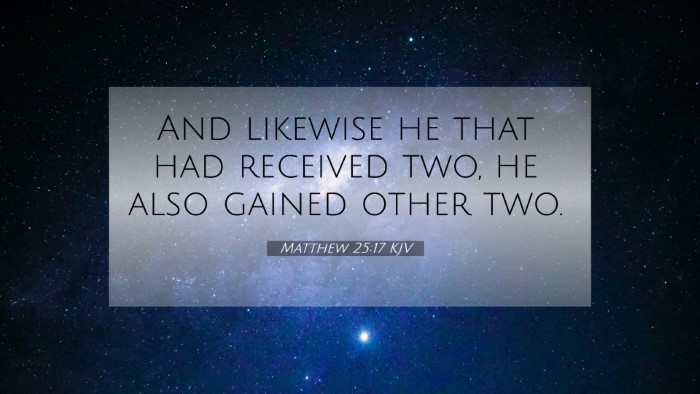Understanding Matthew 25:17
Verse Reference: Matthew 25:17 - "And likewise he that had received two, he also gained other two."
Overview of the Verse
This verse is part of the Parable of the Talents, where a master entrusts his servants with resources while he is away. The servants are judged based on how they manage what they have been given. Here, the servant who received two talents demonstrates faithfulness by doubling his investment.
Combined Insights from Public Domain Commentaries
Matthew Henry: Matthew Henry emphasizes that this parable illustrates the importance of diligence and responsibility in using God-given gifts. Each servant receives according to their ability, showcasing God's justice in allotment. The servant with two talents shows that each individual's contribution, regardless of size, is valuable in the kingdom of God.
Albert Barnes: Albert Barnes focuses on the lesson of faithfulness. The doubling of the talents signifies fruitful labor; it's not merely about the amount gained but the effort and stewardship exhibited. Barnes remarks that these investments reflect one’s commitment to God’s work and the expectations that come with discipleship.
Adam Clarke: Adam Clarke provides a practical interpretation, arguing that the parable presents an urgent call to believers to actively engage in their faith. The outcome of gaining two more talents illustrates that faithfulness will be rewarded, and this serves as encouragement to all believers to be industrious in their service to God.
Connections to Other Bible Verses
Matthew 25:17 connects to various other scriptures that enrich its meaning and provide deeper insights into the themes of stewardship, responsibility, and divine expectance:
- Luke 19:16-17: A parallel account of Jesus' parable of the pounds, emphasizing similar themes of accountability and reward.
- 1 Corinthians 4:2: "Moreover, it is required in stewards, that a man be found faithful," highlighting the expectation of faithfulness in stewardship.
- 2 Timothy 2:15: The directive to be diligent in presenting oneself to God as a worker, underlining the importance of effort in spiritual matters.
- Galatians 6:7-8: The principle of sowing and reaping, correlating with the outcomes of faithfulness in using one’s talents.
- Proverbs 22:29: "Seest thou a man diligent in his business? He shall stand before kings; he shall not stand before mean men," a testament to the rewards of diligence.
- John 15:8: Jesus states that bearing much fruit is evidence of being His disciples, reinforcing the idea of faithful stewardship.
- Matthew 25:21: The rejoicing of the master in response to the faithful servants, which holds significant thematic relevance to 25:17.
Thematic Bible Verse Connections
This examination of Matthew 25:17 reveals broader biblical themes related to stewardship, responsibility, and accountability:
- Stewardship: The biblical mandate to manage God’s resources faithfully is echoed throughout scripture.
- Accountability: The expectation that believers will be held accountable for their actions is a recurrent theme in both the Old and New Testaments.
- Reward for Faithfulness: Numerous scriptures affirm the principle that faithful service yields divine rewards (see also Revelation 22:12).
Tools for Bible Cross-Referencing
To explore connections between Bible verses, consider using these tools:
- Bible Concordance: A comprehensive guide for finding keywords and related verses.
- Bible Cross-Reference Guide: Systems that assist in linking scriptural passages.
- Cross-Reference Bible Study: Methods that involve comparing and contrasting similar verses for deeper understanding.
- Bible Chain References: Tools that facilitate thematic studies through connected verses.
Conclusion
Matthew 25:17 serves as a poignant reminder of the call to faithful stewardship and the blessings that accompany diligence in God's service. This verse, alongside its corresponding scriptural references, illustrates the interconnectedness of Biblical texts, encouraging believers to actively engage in their faith.























